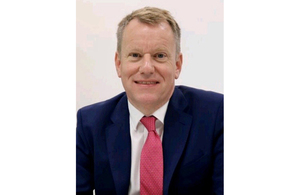£15 million boost to bring better rail journeys to the North East
- over £15 million invested in 3 rail stations in North East to level up infrastructure in the country
- Horden Station in Durham opens with £4.4 million for new stations, meaning more convenient travel and less congestion
- £8.7 million for Darlington station and a further £2.45 million for Middlesbrough station to improve journeys for passengers
Thousands of passengers in the North East of England are set to benefit from more frequent, reliable rail services and better connections, thanks to £15 million of government investment, the Transport Secretary has announced today (29 June 2020).
Horden Station in Durham will open to passengers for the first time today. It will be served by one train per hour calling at all stations between Newcastle and Middlesbrough. This restores a vital link for up to 70,000 passengers in an area that hasn’t had a station in a 20 kilometre stretch after the previous station was closed following the Beeching cuts in 1964.
The £10.55 million project, led by Durham County Council and Network Rail, has been supported by £4.4 million from the Department for Transport’s New Stations Fund.
The Transport Secretary has also announced £8.7 million of investment to develop proposals for a package of enhancements to modernise Darlington station. These include 2 new platforms for local services, one new platform for southbound long-distance services and a raft of improvements to make the station more accessible.
A further £2.45 million has also been agreed to develop proposals at Middlesborough station that would see platform 2 extended to accommodate longer trains with more seats. A new platform would also be built, increasing capacity for local services and delivering more comfortable journeys for passengers.
Transport Secretary and Northern Powerhouse Minister Grant Shapps said:
Our ambitious plans to restore and revitalise the railways of the North East sits at the heart of our commitment to level up infrastructure across the country, build a railway that works for everyone and kickstart our economy as we begin the recovery from COVID-19.
I’ve seen first hand how the new Horden Station will improve connectivity for thousands of people, easing congestion in Durham and enabling quick, convenient travel between Newcastle and Middlesbrough.
By backing proposals to improve both Darlington and Middlesbrough stations, we will work to invigorate rail connections and deliver more modern, reliable services for passengers and businesses now and in the future.
Councillor Simon Henig, leader of Durham County Council, said:
It has been a long held ambition to have a station at Horden so, after a number of years of hard work and commitment by ourselves and our partners, it’s fantastic that we are now ready to welcome the first train and the first passengers.
This new facility will open up significant opportunities for communities across east Durham, by providing a direct transport link to Teesside, Wearside and Tyneside. And, of course, it will also make it easier for people from outside the area to travel to the east of the county, whether for business or pleasure.
It is going to provide a major economic boost to the county and I’m sure residents and businesses will be keen to take advantage.
It comes as the Transport Secretary recently agreed to give £5 million from the Restoring Your Railway funding to Northumberland County Council to develop proposals to drive forward the return of passenger services on the Ashington-Blyth-Tyne line in Northumberland.
The New Stations Fund was launched in 2013 to help give local communities improved access to rail services in England and Wales and has so far helped to fund 10 new stations. The third round of the New Stations Fund, which will invest £20 million in new stations and help restore closed stations to their former glory, has now closed with a decision on successful applicants due in the Autumn.
Tees Valley Mayor Ben Houchen said:
I am delighted that the government has once again thrown its weight behind my plans to upgrade both Darlington and Middlesbrough Station, a move which will help thousands of rail travellers in my region with more frequent and reliable services, and ensure we are better connected to London and the rest of the UK.
Improved rail connectivity will help us attract even more big businesses and high levels of investment to the Tees Valley, which is central to my plan to create good quality, local jobs for people in Teesside, Darlington and Hartlepool.
This £11 million investment is another significant milestone in improving transport connectivity in the Tees Valley and is further proof that this government is serious about its levelling up agenda and giving the north the investment it deserves.
Today’s announcement comes as engineering works continue on the £1.2 billion programme of infrastructure enhancements for the East Coast Main Line (ECML) that will increase capacity and reduce journey times.
Power supplies north of York are being upgraded to enable more electric services to run, minimising the use of diesel fuel and reducing the impact on the environment. The work between York and Newcastle is due to be completed by the end of 2022 with the upgrades between Newcastle and Edinburgh set to be completed around 12 months later.
The East Coast Main Line is also set to become Britain’s first mainline digital rail link with £350 million of new investment to install state-of-the art electronic signalling designed to cut journey times and slash delays.
Conventional signalling will be replaced with a digital system that allows trains to talk to the track allowing the smooth flow of trains, reducing signal failures that every year result in thousands of hours of delays, and making journeys safer.
